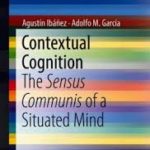Contemporary cognitive neurosciences have reduced mental processes to fragmented cognitive processes. This book challenges this old tradition and introduces two models of contextual social cognition (the collection of psychological processes underlying context-dependent social behavior) and the coupling between action and language (the integration of ongoing actions with verbal information related to the movement). From this, he constructs a novel vision of contextual influences in neurocognition and proposes a new concept: Intercognition, the constant synergy of mental processes that confer a sensus communis to our experience.

